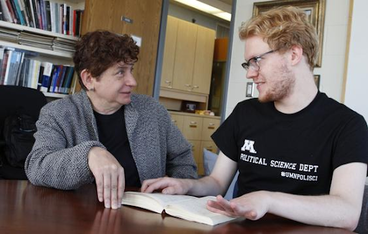
- phase completed
- phase in-progress
The Political Science Department within the College of Liberal Arts enrolls approximately 500 undergraduate students in its major, and its faculty members also teach many non-majors in courses at all levels of its relatively flat curriculum. In all courses, faculty members and instructors assign multiple forms of writing as they prepare students to confront vital issues, raise critical perspectives, and explore new methodologies in the study of the fundamental concepts of power and change.
Writing in Political Science
The Political Science faculty generated the following list in response to the question, “What characterizes academic and professional communication in this discipline?”
Political science divides itself into subfields of political theory, American politics, comparative politics, international relations, and methodology. These diverse subfields engage an extraordinarily wide range of substantive topics, but there is a long-standing consensus within the department that effective writing in political science demonstrates the following characteristics regardless of subfield. These attributes appeared in the department's first writing plan and have been reapproved by the faculty each time that the writing plan has been revised.
Effective writing in political science is:
- Framed around "big" questions and concepts
- Analytic and argumentative
- Thesis-driven
- Based on a critical evaluation of appropriate evidence
- Reliant upon data-based analysis
- Inclusive of scholarly precedents
- Responsive to important counterarguments
Writing Abilities Expected of Political Science Majors
After reviewing ideas submitted by undergraduate majors and faculty colleagues, the Political Science faculty generated the following list in response to this question: “With which writing abilities should students in this unit’s major(s) graduate?”
The faculty agrees that by the time they graduate with a degree in political science, majors should be able to:
- Identify questions germane to the study and practice of politics and explain their relevance;
- Synthesize and evaluate existing approaches to these questions by highlighting their strengths and weaknesses;
- Make plausible arguments that are articulated in contestable thesis statements;
- Evaluate arguments by engaging in searches for relevant and appropriate evidence, explaining why this evidence supports, or fails to support, the argument; and
- Draw evidence-based conclusions and discuss their implications.
In sum, the faculty hopes that political science majors will mature from partisan debaters into thoughtful analysts. The critical evaluation of evidence is a central component of this transformation, because many students believe that they already know all about politics and others are tempted to use personal feelings or convictions as evidence. One of the threads appearing throughout the major’s curriculum is identifying relevant and trustworthy sources of information and evaluating them critically.
The skills listed in this section are generic, but there is widespread agreement among the faculty that their wide applicability should be considered a virtue. Their generic nature reflects the diverse range of writing assignments that political science majors will complete during their time at the University. Some involve the close analysis of ancient texts, others involve country-specific case studies, and still others incorporate mathematical models or the statistical assessment of quantitative data.
Menu of Grading Criteria Used in Political Science Courses
In their Writing Plan, the Political Science faculty generated the following menu of grading criteria from which they, and other instructors in the department, can adapt relevant items to use in assessing student writing:
The text...
- Identifies questions germane to the study and practice of politics
- Explains why these questions are germane to the study and practice of politics
- Synthesizes existing approaches to these questions
- Evaluates existing approaches to these questions by highlighting strengths, weaknesses, and/or gaps
- Makes a plausible argument
- Articulates an argument in a contestable thesis statement
- Advances an argument using a logical organization
- Explains why this evidence supports, or fails to support, the argument
- Draws conclusions based on evidence
- Identifies implications of these conclusions
- Uses grammar and mechanics that do not interfere with transmission of meaning
- Uses accurate terms precisely to enhance the transmission of meaning
Highlights from the Writing Plan
Among recent implementation efforts, the department conducted a longitudinal study of volunteer students as they learned to write from 1K-level courses onward. The study involved collection of writing samples and correlative interviews about students' experiences as writers.
Indicative of the department’s long-term goals, the faculty has re-committed itself to employing language from the Writing Plan in course materials in order to help students detect consistency amongst courses in the department's flat curriculum. Finally, to ensure ongoing implementation of its Writing Plan, the department has institutionalized the WEC Faculty Liaison position, integrating it into the regular departmental administrative structure. Among other responsibilities, the Liaison has coordinated a number of workshops and conversations to support graduate student instructors and teaching assistants in the teaching of writing.
Ph.D. alumni of the department have organized a Facebook group (MNstructors) focused on teaching issues; the group convened a small interactive conference in summer 2014, focused on matters of professionalism and pedagogy, including the teaching of undergraduate writers in Political Science. Current faculty members and graduate students in the department were invited.
Each spring, the department awards the annual William Jennings Bryan Essay Prize. Professors from any Political Science course nominate outstanding undergraduate student essays, subject to the student’s approval, and a cash prize is awarded.
